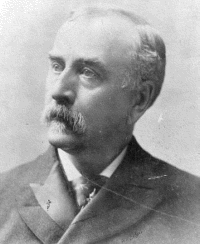 SKC Films Library SKC Films Library |
|
|
| SKC Films Library >> American History >> United States: General History and Description >> Late 19th Century, 1865-1900 >> Biography, A-Z |
 J. Sterling Morton J. Sterling Mortonthe "creator" of Arbor Day Julius Sterling Morton was born in Adams, New York, on April 22, 1832, but grew up in Detroit. He graduated from the University of Michigan in 1854, married Caroline Joy French on October 22 of that same year, and soon after moved to Nebraska Territory. The Morton Family eventually included four sons. In Nebraska, Morton began working for the territory's first newspaper, the Nebraska City News, of which he later became editor. He also became a successful farmer and was often sought out as an expert on improving local crop yields. Many of his editorials advocated the planting of trees to enrich the soil and conserve moisture, and he set an example for his friends and neighbors by planting orchards, shade trees and wind breaks on his own farm. Morton's political career began in 1855, when he was elected to the Nebraska Territorial Legislature, where he served until 1858. In 1858, President James Buchanan named him Secretary of Nebraska Territory, and he subsequently served in that position until 1861. Soon after Nebraska was admitted as a state, he was appointed to the State Board of Agriculture. On January 4, 1872, Morton introduced a resolution before the Board that April 10 "...be set apart and consecrated for tree planting in the State of Nebraska and that the State Board of Agriculture hereby name it Arbor Day...” The resolution was passed unanimously. On the appointed day, prizes were offered to organizations, counties, and local committees for planting the most trees, and over one million trees were planted that day alone. The overwhelming public response to the first ever Arbor Day led the U.S. Congress to pass the 1873 Timber Culture Act, which offered free land to western settlers who agreed to plant trees on their claims. Arbor Day was celebrated in Nebraska on April 10 every year until 1885, when it was made a legal state holiday and the date was changed to April 22 to coincide with Morton's birthday. April 22 is still a legal holiday in Nebraska to this day, with schools and public offices being closed in observance. In 1893, President Grover Cleveland named Morton as his Secretary of Agriculture, in which capacity he served until 1897. As Secretary, Morton was instrumental in making the Department into a coordinated service for farmers. He also supported President Cleveland in setting up national forest reservations. In 1897, he planned and began editing the multi-volume Illustrated History of Nebraska, and also began publishing the weekly periodical The Conservationist. Julius Sterling Morton died while visiting his son in Lake Forest, Illinois, on April 27, 1902. A special train carried his body back to Nebraska City where, after lying in state, it was buried in Wyuka Cemetery. The Morton family donated their mansion to the State of Nebraska in 1903, and it is now operated as Arbor Lodge State Park. SEE ALSO |
| SKC Films Library >> American History >> United States: General History and Description >> Late 19th Century, 1865-1900 >> Biography, A-Z This page was last updated on April 21, 2017. |